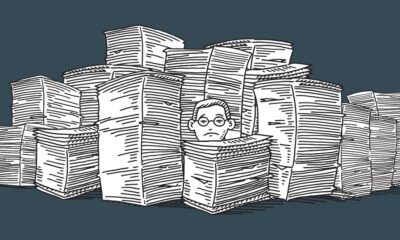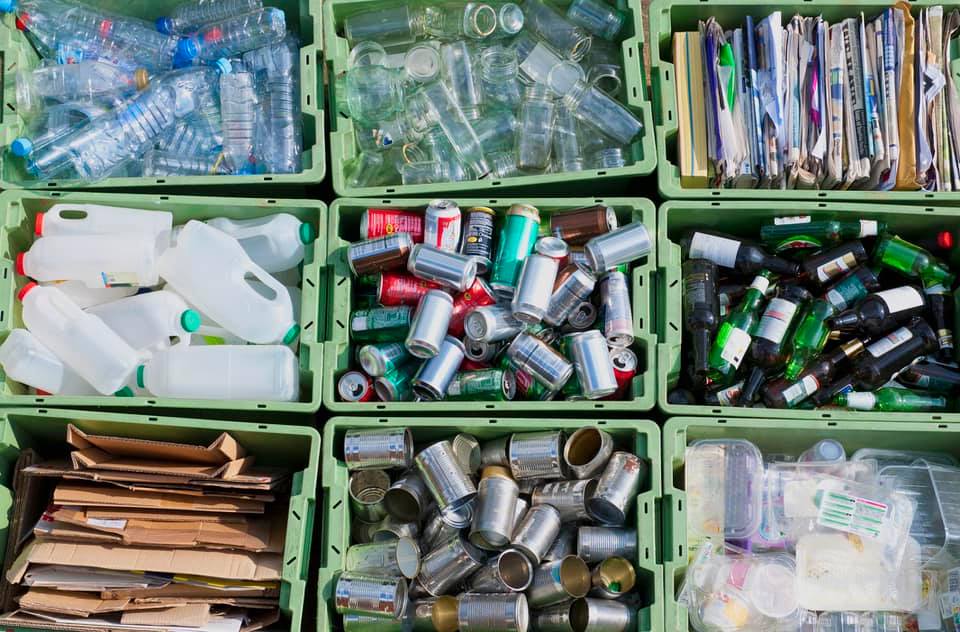
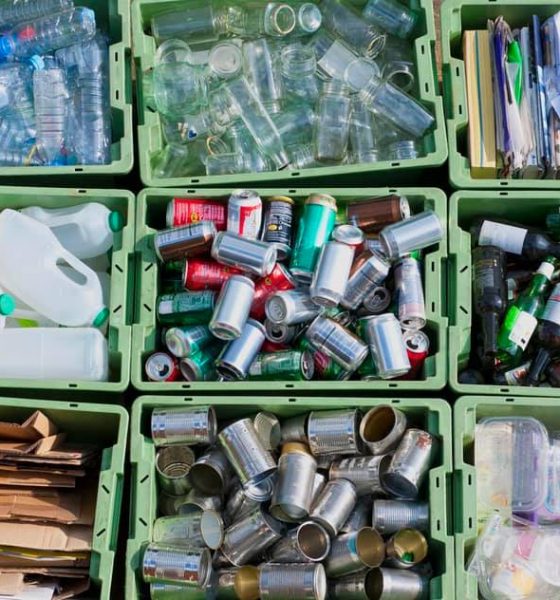
Environment
Waste Management in Moldova: is the society ready to sort and recycle?
Many say that people in Moldova don’t have the necessary knowledge or motivation to start separating their rubbish, nor have they the proper mindset to do it thoroughly. They say: “people in Moldova are not educated, authorities in Moldova don’t have budgets to sort and recycle.” However, when an opportunity to improve things is given, it still gets irresponsibly missed. How does this happen?
While there are entire cities in Japan that conduct waste management programs, which include separating trash into 34 categories (!), as well as recycling and composting almost the entire amount of household rubbish, cities and villages in Moldova still dump their trash in landfill sites.
There is only one private company located near the Moldovan capital city that has been trying, for years, to convince citizens and authorities that separating and recycling waste is not impossible to implement. Even though we are talking about a country with no infrastructure in this respect, and it does require a considerable effort and investments, it is also more ecological, healthy and can even be profitable to recycle and reuse the waste material.
A problem or a solution?
On January 21, the company ABS Recycling – the only waste sorting station in Chisinau – published an open letter addressed to President Maia Sandu, Mayor of Chisinau Ion Ceban, the Chisinau Municipal Council, as well as to the related ministries, stating that the company must close down its activity related to mixed municipal waste sorting.
According to the company’s statement, thanks to the existing sorting lines, 12 types of recyclable waste was sorted by 200 employees, that meaning 15% of the delivered rubbish total mass or 40% of its volume. Consequently, less trash arrived in Tantareni – the main landfill site where the rubbish from Chisinau has been disposed for decades, creating a multitude of environmental and health problems for residents.
About 600 tons of waste are transported from Chisinau to the Tantareni landfill site every day.
ABS Recycling has been sorting the mixed municipal waste for free, within a pilot project in collaboration with Chisinau City Hall since 2017. The sorted materials were shipped for recycling afterwards. President of ABS Recycling, Serghei Balica, claimed that the activity of separating the municipal waste couldn’t be continued due to sorting costs, which were higher than the value of recyclables. “If there is no support from the local authorities as the main waste supplier, the bankruptcy of a private company takes place,” mentioned the company’s representatives.
Mayor of Chisinau, Ion Ceban, claimed that he was never against the activity of ABS Recycling and that the municipality didn’t close down the waste collection and sorting station, which is a private business project.
“We will make every effort to prepare the technical task and complete all legal formalities for launching the partnership. I remind you that in 2016, this company launched its activity within a pilot project with the need to collect plastic to develop the recycling service. Thus, several tons of municipal waste reached ABS Recycling every day, the company kept 15% of waste, which was later taken to the recycling factory in Peresecina,” said Ceban. At the same time, no statement regarding the needed financial support from the local authorities was made.
According to Municipal Councillor, Ina Coșeru, the Chisinau Municipal Council voted, in August 2020, to establish a public-private partnership for sorting the rubbish collected in the capital city, but no funds from the public budget were allocated for sorting the mixed waste. Moreover, a contracting company wasn’t identified, as NewsMaker informed.
Beside establishing a public-private partnership for sorting the waste collected in the capital city, there is a faster option of organising a tender, where resources would be identified and an agreement could be reached with a private company proposing the lowest price, as the environmental activist Evghenii Camenscic declared.
At the same time, the tax for municipal waste management covers only the costs of collection, transportation and partially for storage of municipal waste, excluding the sorting stage, as it is mentioned in the Declaration of the National Platform of the Eastern Partnership Civil Society Forum on Household Solid Waste Sorting in Chisinau.
Citizens instead of authorities
ABS Recycling representatives specified that the company still collects and sends for recycling the waste which was separated at home and thrown away in the company’s wire containers and the yellow container of the municipality. They also mentioned that the company doesn’t intend to cease its activity.
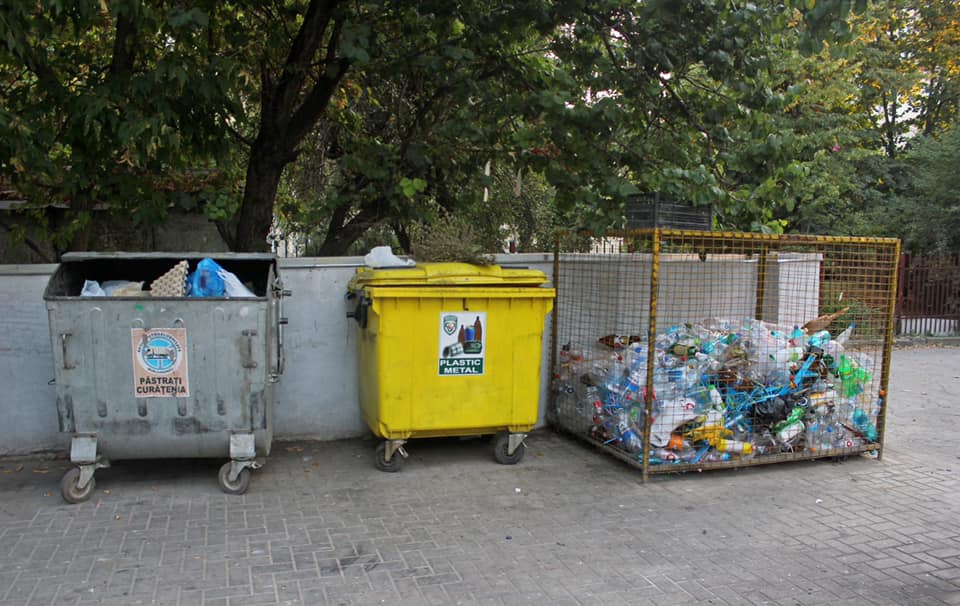
“On the contrary, we will activate more intensely, according to another working model, which excludes dependence on political decisions.”
The company asked the residents of Chisinau to fill in a request of installing a garbage can for collecting packaging waste. “The wire containers will be installed by ABS and serviced free of charge.” In such a way, the ordinary citizen would become the waste supplier, not the municipal authorities, as it is supposed to be.
“Our goal is to invest in the environment and clean up the city according to the models practiced in developed countries. This is what we will continue to do, far from political quarrels.”
What’s more, the company encourages people to post on social media about their experience of sorting, reusing, sustainable purchasing to share best practices, inspire and educate others.
**
The Law no. 209/2016 on Waste Management, adopted several years ago, includes the provisions of the Waste Framework Directive of the European Union, which are mentioned in the Moldova – European Union Association Agreement. The Republic of Moldova committed to improve the waste management process by implementing all waste management processes (collection, transportation, recovery through recycling and energy, disposal by storage).
“It’s a matter of deep regret that this is done to a very small extent and only at the initiative of individual economic agents or civil society, not at the initiative of local public authorities, although municipal waste is the main task of local public administration,” it is mentioned in the Declaration of the National Platform of the Eastern Partnership Civil Society Forum on Household Solid Waste Sorting in Chisinau.
The population of the Moldovan capital city produces more than a third of all country’s waste. 65% of municipal waste collected in Chisinau is represented by the household rubbish. The share of waste that is sorted at home is almost insignificant. This is why, the only waste sorting station in Chisinau hires only several employees (instead of 200 employees who worked before) to separate and transport the waste collected through their own containers.
Moldova (especially its big cities) needs a thorough industrial transporting and sorting system, so that materials with potential for recovery can be recycled, instead of reaching landfills sites.
Nowadays, most of the country’s waste becomes garbage, being disposed on landfills sites (some of them being unauthorised and polluting water, air and soil) or is destroyed by combustion eliminating toxic gases in the air.
As it seems, central and local authorities are the most unprepared to face the situation as it is. They hide in plain sight, refusing to cooperate, invest and look for solutions. Moldovan citizens lack the basic knowledge and long-term perspective regarding the rubbish disposal and the degree of harm it can cause. The latter is easier to correct though, when there is a untrustworthy government, with officials who don’t understand that they are the citizens of the same country and they are also affected by the same environmental issues.
Photo: ABS Recycling Moldova| Facebook
Society
“They are not needy, but they need help”. How Moldovan volunteers try to create a safe environment for the Ukrainian refugees

At the Government’s ground floor, the phones ring constantly, the laptop screens never reach standby. In one corner of the room there is a logistics planning meeting, someone has a call on Zoom with partners and donors, someone else finally managed to take a cookie and make some coffee. Everyone is exhausted and have sleepy red eyes, but the volunteers still have a lot of energy and dedication to help in creating a safe place for the Ukrainian refugees.
“It’s like a continuous bustle just so you won’t read the news. You get home sometimes and you don’t have time for news, and that somehow helps. It’s a kind of solidarity and mutual support,” says Vlada Ciobanu, volunteer responsible for communication and fundraising.
The volunteers group was formed from the very first day of war. A Facebook page was created, where all types of messages immediately started to flow: “I offer accommodation”, “I want to help”, “I want to get involved”, “Where can I bring the products?”, “I have a car and I can go to the customs”. Soon, the authorities also started asking for volunteers’ support. Now they all work together, coordinate activities and try to find solutions to the most difficult problems.
Is accommodation needed for 10, 200 or 800 people? Do you need transportation to the customs? Does anyone want to deliver 3 tons of apples and does not know where? Do you need medicine or mobile toilets? All these questions require prompt answers and actions. Blankets, sheets, diapers, hygiene products, food, clothes – people bring everything, and someone needs to quickly find ways of delivering them to those who need them.
Sometimes this collaboration is difficult, involves a lot of bureaucracy, and it can be difficult to get answers on time. “Republic of Moldova has never faced such a large influx of refugees and, probably because nobody thought this could happen, a mechanism of this kind of crisis has not been developed. Due to the absence of such a mechanism that the state should have created, we, the volunteers, intervened and tried to help in a practical way for the spontaneous and on the sport solutions of the problems,” mentions Ecaterina Luțișina, volunteer responsible for the refugees’ accommodation.
Ana Maria Popa, one of the founders of the group “Help Ukrainians in Moldova/SOS Українці Молдовa” says that the toughest thing is to find time and have a clear mind in managing different procedures, although things still happen somehow naturally. Everyone is ready to intervene and help, to take on more responsibilities and to act immediately when needed. The biggest challenges arise when it is necessary to accommodate large families, people with special needs, for which alternative solutions must be identified.
Goods and donations
The volunteers try to cope with the high flow of requests for both accommodation and products of all kinds. “It came to me as a shock and a panic when I found out that both mothers who are now in Ukraine, as well as those who found refuge in our country are losing their milk because of stress. We are trying to fill an enormous need for milk powder, for which the demand is high and the stocks are decreasing”, says Steliana, the volunteer responsible for the distribution of goods from the donation centers.
Several centers have been set up to collect donations in all regions of Chisinau, and volunteers are redirecting the goods to where the refugees are. A system for processing and monitoring donations has already been established, while the volunteer drivers take over the order only according to a unique code.
Volunteers from the collection centers also do the inventory – the donated goods and the distributed goods. The rest is transported to Vatra deposit, from where it is distributed to the placement centers where more than 50 refugees are housed.
When they want to donate goods, but they don’t know what would be needed, people are urged to put themselves in the position of refugees and ask themselves what would they need most if they wake up overnight and have to hurriedly pack their bags and run away. Steliana wants to emphasise that “these people are not needy, but these people need help. They did not choose to end up in this situation.”
Furthermore, the volunteer Cristina Sîrbu seeks to identify producers and negotiate prices for products needed by refugees, thus mediating the procurement process for NGOs with which she collaborates, such as Caritas, World Children’s Fund, Polish Solidarity Fund, Lifting hands, Peace Corps and others.
One of the challenges she is facing now is the identifying a mattress manufacturer in the West, because the Moldovan mattress manufacturer that has been helping so far no longer has polyurethane, a raw material usually imported from Russia and Ukraine.
Cristina also needs to find solutions for the needs of the volunteer groups – phones, laptops, gsm connection and internet for a good carrying out of activities.
Hate messages
The most difficult thing for the communication team is to manage the hate messages on the social networks, which started to appear more often. “Even if there is some sort of dissatisfaction from the Ukrainian refugees and those who offer help, we live now in a very diverse society, there are different kind of people, and we act very differently under stress,” said Vlada Ciobanu.
Translation by Cătălina Bîrsanu
Featured
FC Sheriff Tiraspol victory: can national pride go hand in hand with political separatism?

A new football club has earned a leading place in the UEFA Champions League groups and starred in the headlines of worldwide football news yesterday. The Football Club Sheriff Tiraspol claimed a win with the score 2-1 against Real Madrid on the Santiago Bernabeu Stadium in Madrid. That made Sheriff Tiraspol the leader in Group D of the Champions League, including the football club in the groups of the most important European interclub competition for the first time ever.
International media outlets called it a miracle, a shock and a historic event, while strongly emphasizing the origin of the team and the existing political conflict between the two banks of the Dniester. “Football club from a pro-Russian separatist enclave in Moldova pulls off one of the greatest upsets in Champions League history,” claimed the news portals. “Sheriff crushed Real!” they said.
Moldovans made a big fuss out of it on social media, splitting into two groups: those who praised the team and the Republic of Moldova for making history and those who declared that the football club and their merits belong to Transnistria – a problematic breakaway region that claims to be a separate country.
Both groups are right and not right at the same time, as there is a bunch of ethical, political, social and practical matters that need to be considered.
Is it Moldova?
First of all, every Moldovan either from the right or left bank of Dniester (Transnistria) is free to identify himself with this achievement or not to do so, said Vitalie Spranceana, a sociologist, blogger, journalist and urban activist. According to him, boycotting the football club for being a separatist team is wrong.
At the same time, “it’s an illusion to think that territory matters when it comes to football clubs,” Spranceana claimed. “Big teams, the ones included in the Champions League, have long lost their connection both with the countries in which they operate, and with the cities in which they appeared and to which they linked their history. […] In the age of globalized commercial football, teams, including the so-called local ones, are nothing more than global traveling commercial circuses, incidentally linked to cities, but more closely linked to all sorts of dirty, semi-dirty and cleaner cash flows.”
What is more important in this case is the consistency, not so much of citizens, as of politicians from the government who have “no right to celebrate the success of separatism,” as they represent “the national interests, not the personal or collective pleasures of certain segments of the population,” believes the political expert Dionis Cenusa. The victory of FC Sheriff encourages Transnistrian separatism, which receives validation now, he also stated.
“I don’t know how it happens that the “proud Moldovans who chose democracy”, in their enthusiasm for Sheriff Tiraspol’s victory over Real Madrid, forget the need for total and unconditional withdrawal of Russian troops from Transnistria!” declared the journalist Vitalie Ciobanu.
Nowadays, FC Sheriff Tiraspol has no other choice than to represent Moldova internationally. For many years, the team used the Moldovan Football Federation in order to be able to participate in championships, including international ones. That is because the region remains unrecognised by the international community. However, the club’s victory is presented as that of Transnistria within the region, without any reference to the Republic of Moldova, its separatist character being applied in this case especially.
Is it a victory?
In fact, FC Sheriff Tiraspol joining the Champions League is a huge image breakthrough for the Transnistrian region, as the journalist Madalin Necsutu claimed. It is the success of the Tiraspol Club oligarchic patrons. From the practical point of view, FC Sheriff Tiraspol is a sports entity that serves its own interests and the interests of its owners, being dependent on the money invested by Tiraspol (but not only) oligarchs.
Here comes the real dilemma: the Transnistrian team, which is generously funded by money received from corruption schemes and money laundering, is waging an unequal fight with the rest of the Moldovan football clubs, the journalist also declared. The Tiraspol team is about to raise 15.6 million euro for reaching the Champions League groups and the amounts increase depending on their future performance. According to Necsutu, these money will go directly on the account of the club, not to the Moldovan Football Federation, creating an even bigger gab between FC Sheriff and other football clubs from Moldova who have much more modest financial possibilities.
“I do not see anything useful for Moldovan football, not a single Moldovan player is part of FC Sheriff Tiraspol. I do not see anything beneficial for the Moldovan Football Federation or any national team.”
Is it only about football?
FC Sheriff Tiraspol, with a total estimated value of 12.8 million euros, is controlled by Victor Gusan and Ilya Kazmala, being part of Sheriff Holding – a company that controls the trade of wholesale, retail food, fuels and medicine by having monopolies on these markets in Transnistria. The holding carries out car trading activities, but also operates in the field of construction and real estate. Gusan’s people also hold all of the main leadership offices in the breakaway region, from Parliament to the Prime Minister’s seat or the Presidency.
The football club is supported by a holding alleged of smuggling, corruption, money laundering and organised crime. Moldovan media outlets published investigations about the signals regarding the Sheriff’s holding involvement in the vote mobilization and remuneration of citizens on the left bank of the Dniester who participated in the snap parliamentary elections this summer and who were eager to vote for the pro-Russian socialist-communist bloc.
Considering the above, there is a great probability that the Republic of Moldova will still be represented by a football club that is not identified as being Moldovan, being funded from obscure money, growing in power and promoting the Transnistrian conflict in the future as well.
Photo: unknown
Elections
Russia’s legislative elections: Why are there 27 polling stations in Transnistria?
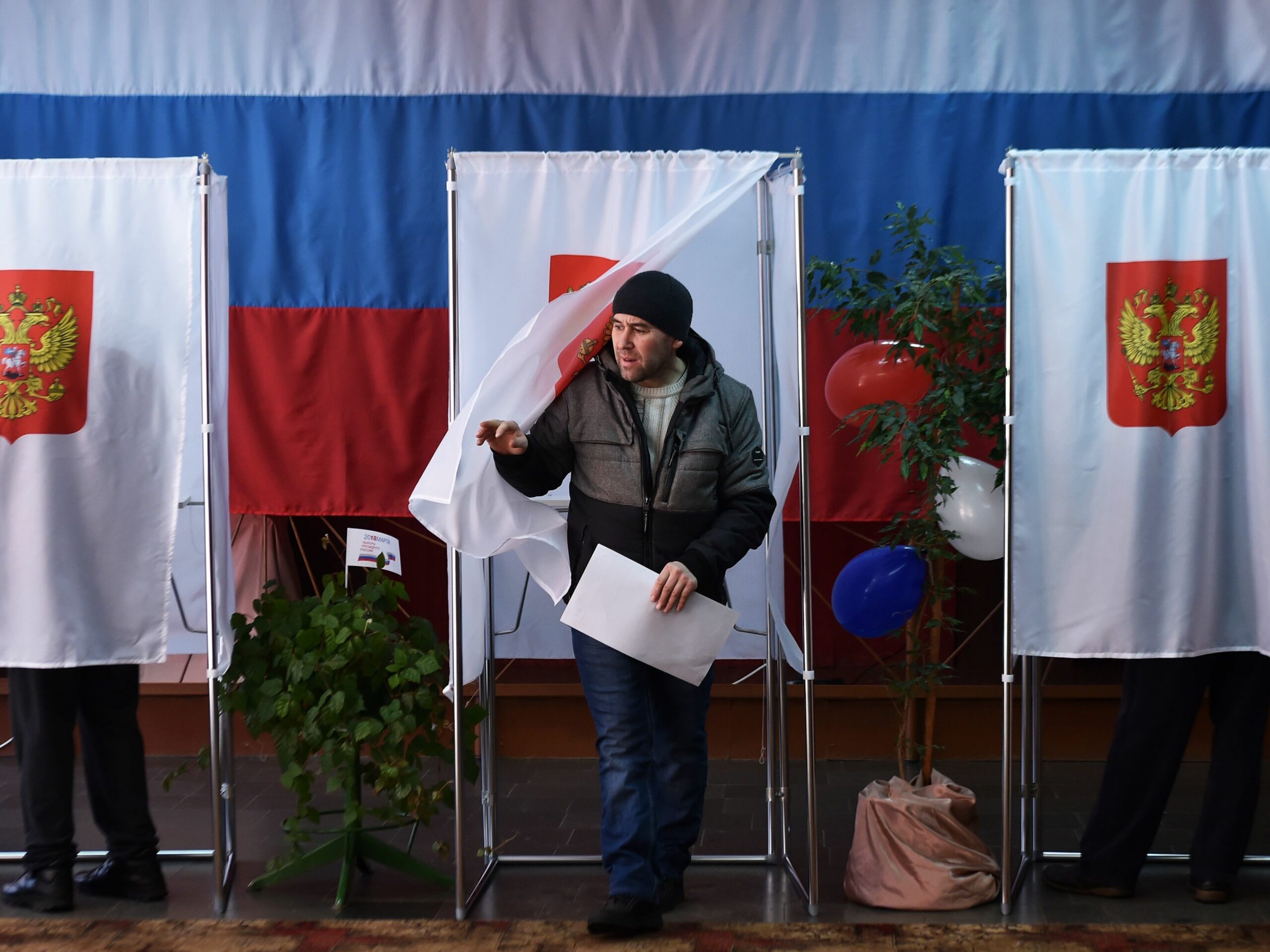
Legislative elections are currently being held in Russia between September 17-19, as 450 new members in the State Duma need to be elected.
The Central Election Commission (CEC) of the Russian Federation decided to open a record number of polling stations in the Transnistrian region – 27 polling stations, in addition to only 3 polling station opened on the right bank of the Dniester in such big cities as Chisinau, Comrat and Balti.
That is the largest number of polling stations opened by the Russian CEC in a foreign country, and five polling stations more than in the 2016 elections. Two of the polling stations were established in Tiraspol, being open from Friday to Sunday. The rest of the Russian polling stations on the Transnistrian territory are opened on Sunday only. The most astonishing fact is that no state other than Russia has ever opened polling stations in the separatist region of the Republic of Moldova. Actually, no polling stations are being opened on the Transnistrian territory when it comes to national elections of the Republic of Moldova either.
Therefore, one could say that the stakes are high when it comes to Transnistrian voters, especially since, most likely, the hopes of Russian authorities are not necessarily based on a large turnout and their real support, rather on the real possibility of electoral fraud on a territory that is not controlled by the constitutional authorities in Chisinau.
Before the presidential elections in 2018, Russian authorities announced that there are 220 thousand Russian citizens living in the Transnistrian region. That time, 24 polling stations were opened in the separatist area. Despite the fact that the Tiraspol Electoral Commission announced that, in the last year and a half alone, the voter turnout has officially fallen in the region by more than 7 700 people, the Russian CEC still decided to establish a record number of polling stations this year, which strengthened the argument about the possibility of election fraud.
Both Tiraspol’s administration and the regional media campaigned for the ruling political party United Russia and called for a high turnout at polling stations. Transnistria’s leader, Vadim Krasnoselski, urged the people on the left bank of the Dniester to come to the polls “because despite all the difficulties, Russia does not forget Transnistria and helps it as much as possible.”
It seems that the campaigning, along with the Russian sponsorship in the region, show great results during every election ballot, as Russian citizens voting in Russian elections in Transnistria are a more active electorate than Moldovan citizens residing in Transnistria and voting in the Moldovan elections at the polling stations arranged on the other bank of the Dniester, especially for them. In the previous Russia’s legislative elections, 56 thousand people voted in Transnistria, while just under 29 thousand inhabitants of the Transnistrian region voted in the recent Moldova’s parliamentary elections.
Before every election ballot held in the Russian Federation, Moldovan authorities make statements, suggesting the Russian side to abstain from opening polling stations in Transnistria, whereas Russian authorities ignore them every time.
This year, the Ministry of Foreign Affairs and European Integration of the Republic of Moldova also sent a note of protest against opening the polling stations in Transnistria. “The Ministry of Foreign Affairs and European Integration regrets that, despite the position consistently expressed by the Moldovan authorities, the Russian side acted in a manner that does not correspond to the principle of sovereignty and territorial integrity of the Republic of Moldova and the bilateral legal framework.”
The Ministry representatives noted that Russian authorities were informed of the lack of impediments to open polling stations in localities under the control of Moldova’s constitutional authorities and requested the Russian side to refrain from opening the 27 polling stations in the localities of the breakaway region, given the impossibility of ensuring the necessary security conditions for the current elections.
Moscow’s Central Election Commission also opened nine polling stations in Abkhazia and ten in South Ossetia – two disputed territories that were internationally recognised by Russia and a few more countries, while considered under military occupation, according to the Georgian Government. These lands, that are under the exclusive control of Russia, offer good opportunities to ‘correct’ any uncomfortable results obtained in the country, where the ruling political party no longer enjoys as much support as it wants to appear.
Photo: wjct.org












